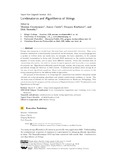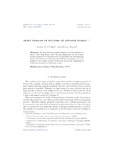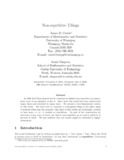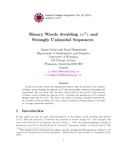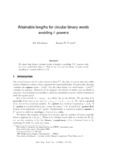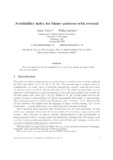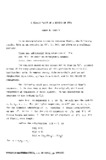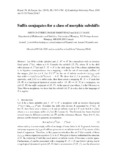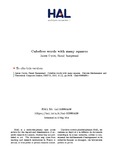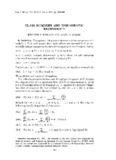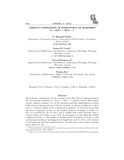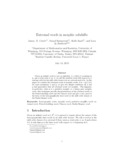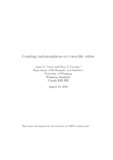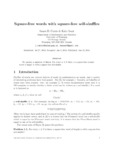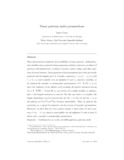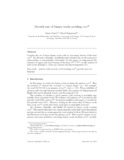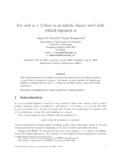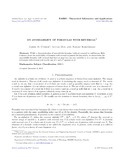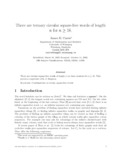Search
Now showing items 1-20 of 26
Combinatorics and Algorithmics of Strings
(Dagstuhl Publishing, 2014-03-09)
Strings (aka sequences or words) form the most basic and natural data structure. They occur whenever information is electronically transmitted (as bit streams), when natural language text is spoken or written down (as words ...
Least Periods of Factors of Infinite Words
(EDP Sciences, 2009)
We show that any positive integer is the least period of a factor of the Thue-Morse word. We also characterize the set of least periods of factors of a Sturmian word. In particular, the corresponding set for the Fibonacci ...
Non-Repetitive Tilings
(The Electronic Journal of Combinatorics, 2002-07-03)
In 1906 Axel Thue showed how to construct an infinite non-repetitive (or square-free) word on an alphabet of size 3. Since then this result has been rediscovered many times and extended in many ways. We present a two-dimensional ...
Binary Words Avoiding xxRx and Strongly Unimodal Sequences
(2015-09-14)
In previous work, Currie and Rampersad showed that the growth of the number
of binary words avoiding the pattern xxxR was intermediate between polynomial and
exponential. We now show that the same result holds for the ...
Attainable lengths for circular binary words avoiding k-powers
(The Belgian Mathematical Society, 2005)
We show that binary circular words of length n avoiding 7/3+ powers exist
for every sufficiently large n. This is not the case for binary circular words
avoiding k+ powers with k < 7/3
Avoidability index for binary patterns with reversal
(2017)
For every pattern p over the alphabet {x,x^R,y,y^R}, we specify the least k such that p is k-avoidable.
A direct proof of a result of Thue
(Utilitas Mathematica, 1984)
Suffix conjugates for a class of morphic subshifts
(Cambridge University Press, 2015-09)
Let A be a finite alphabet and f: A^* --> A^* be a morphism with an iterative fixed point f^\omega(\alpha), where \alpha{} is in A. Consider the subshift (X, T), where X is the shift orbit closure of f^\omega(\alpha) and ...
Cubefree words with many squares
(Discrete Mathematics and Theoretical Computer Science, 2014-05-13)
We construct infinite cubefree binary words containing exponentially many distinct squares of length n . We also show that for every positive integer n , there is a cubefree binary square of length 2n.
Class Numbers and Biquadratic Reciprocity
(Cambridge University Press, 1982)
Abelian complexity of fixed point of morphism 0 ↦ 012, 1 ↦ 02, 2 ↦ 1
(Integers, 2014-02-20)
We study the combinatorics of vtm, a variant of the Thue-Morse word generated by the non-uniform morphism 0 ↦ 012, 1 ↦ 02, 2 ↦ 1 starting with 0. This infinite ternary sequence appears a lot in the literature and finds ...
Extremal words in morphic subshifts
(Elsevier, 2014-01-22)
Given an infinite word x over an alphabet A, a letter b occurring in
x, and a total order \sigma on A, we call the smallest word with respect to \sigma
starting with b in the shift orbit closure of x an extremal word of ...
Counting endomorphisms of crown-like orders
(Springer, 2002-12)
The authors introduce the notion of crown-like orders and introduce powerful tools for counting the endomorphisms of orders of this type.
Square-free Words with Square-free Self-shuffles
(The Electronic Journal of Combinatorics, 2014-01-12)
We answer a question of Harju: For every n ≥ 3 there is a square-free ternary word of length n with a square-free self-shuffle.
Unary patterns under permutations
(Elsevier, 2018-06-04)
Thue characterized completely the avoidability of unary patterns. Adding function variables gives a general setting capturing avoidance of powers, avoidance of patterns with palindromes, avoidance of powers under coding, ...
Growth rate of binary words avoiding xxxR
(Elsevier, 2016-01)
Abstract
Consider the set of those binary words with no non-empty factors of the form
xxx^R. Du, Mousavi, Schaeffer, and Shallit asked whether this set of words grows
polynomially or exponentially with length. In this ...
For each a > 2 there is an Infinite Binary Word with Critical Exponent a
(The Electronic Journal of Combinatorics, 2008-08-31)
The critical exponent of an infinite word w is the supremum of all rational numbers α such that w contains an α-power. We resolve an open question of Krieger and Shallit by showing that for each α>2 there is an infinite ...
Characterization of the lengths of binary circular words containing no squares other than 00, 11, and 0101
(2020-05-19)
We characterize exactly the lengths of binary circular words containing no squares other than 00, 11, and 0101.
On avoidability of formulas with reversal
(EDP Sciences, 2018-02-13)
While a characterization of unavoidable formulas (without reversal) is well-known, little
is known about the avoidability of formulas with reversal in general. In this article, we characterize the unavoidable formulas ...
There are Ternary Circular Square-Free Words of Length n for n ≥ 18
(The Electronic Journal of Combinatorics, 2002-10-11)
There are circular square-free words of length n on three symbols for n≥18. This proves a conjecture of R. J. Simpson.

